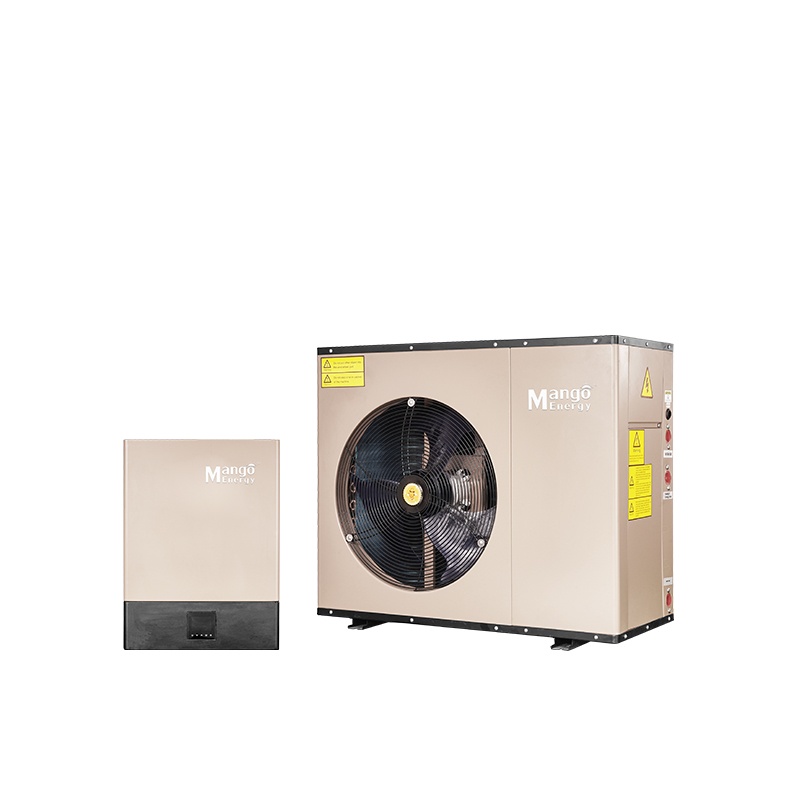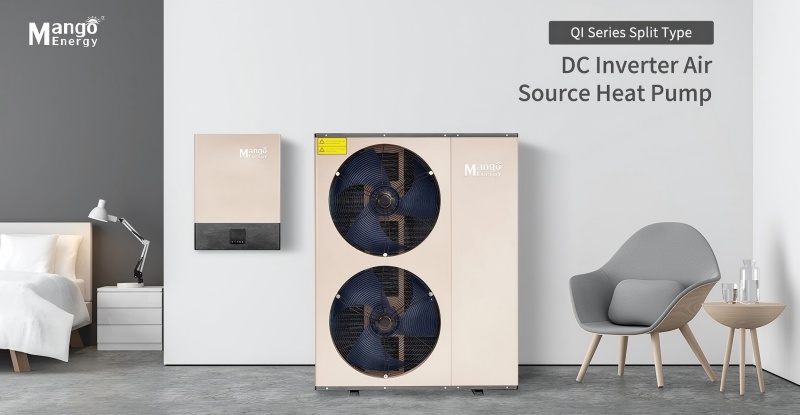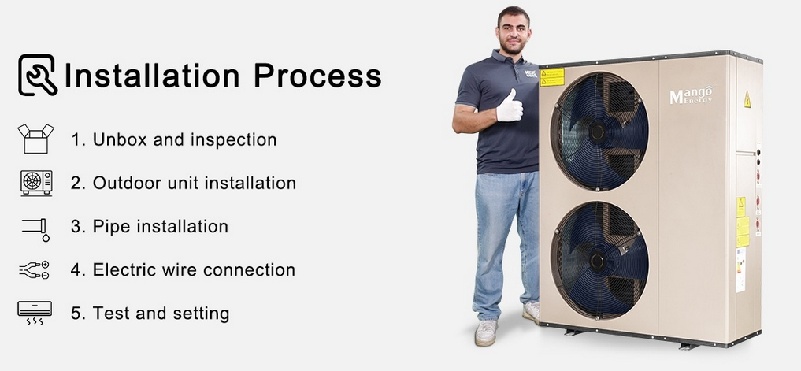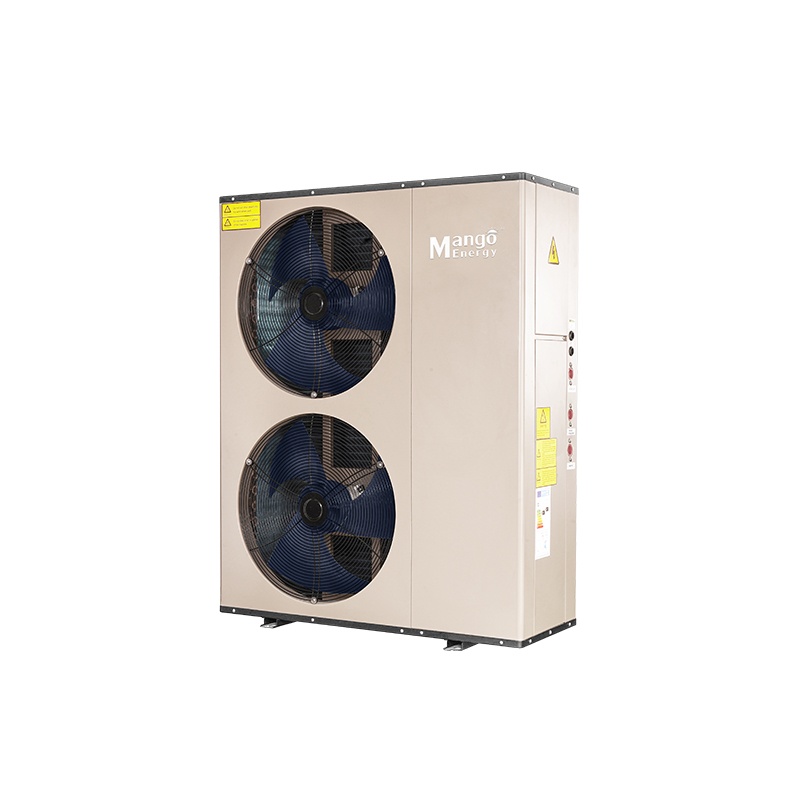
In the global shift toward low-carbon heating and cooling solutions, DC inverter heat pumps are becoming an increasingly preferred choice across both residential and light commercial applications. As an HVAC engineer, procurement manager, or project designer, a key decision you’ll face is this:
Should you choose a split type DC inverter heat pump or a monoblock unit?
While both leverage inverter-driven compressors and high-efficiency refrigerant systems, their structural differences lead to major variations in installation, performance, and long-term cost of ownership. In this article, we’ll examine both solutions in depth, drawing on the technical expertise and product innovation of Mango Energy, a professional DC inverter heat pump supplier in China.
1. Understanding the Two Heat Pump Types
What Is a Split Type DC Inverter Heat Pump?
A split type system separates the main refrigeration components into two parts:
Outdoor Unit: Contains the compressor, condenser, expansion valve.
Indoor Unit: Includes the evaporator and water/air-side heat exchanger.
These are connected by insulated refrigerant pipes, allowing for greater indoor installation flexibility and reduced indoor noise. The system is ideal for homes and facilities requiring zoned or distributed heating/cooling.
What Is a Monoblock DC Inverter Heat Pump?
In contrast, a monoblock inverter heat pump integrates all components — compressor, pumps, heat exchangers — into one compact outdoor unit. Only water lines enter the building, and no refrigerant handling is required during installation. This makes it more straightforward for many installers and property owners, especially in small- to medium-scale retrofits.

2. Technical Comparison: Key Differences in System Design
| Aspect | Split Type Inverter Heat Pump | Monoblock Inverter Heat Pump |
|---|---|---|
| Structure | Indoor + Outdoor Unit | Integrated Outdoor Unit |
| Piping | Requires refrigerant piping (insulated) | Only water pipes needed |
| F-Gas Certification | Required (in many countries) | Not required |
| Installation | More complex (specialized labor) | Simpler and faster |
| Noise Control | Lower indoor noise | Slightly higher, outdoor only |
| Maintenance | Indoor & outdoor components | One maintenance point |
| Freeze Risk | Lower (indoor evaporator) | Higher (outdoor water lines) |
| Initial Cost | Slightly higher | Lower upfront |
| Applications | Homes with zoning, large villas, offices | Compact homes, quick retrofits, mild climates |
3. Performance in Varying Climate Conditions
Modern DC inverter heat pumps are designed to adapt to fluctuating external temperatures, adjusting compressor speed to maintain a constant indoor environment. However, cold climate performance can differ depending on the system configuration.
Split Type Advantages in Cold Climates:
Better insulation of refrigerant lines (vs. exposed water in monoblock)
Indoor evaporator is less prone to freezing
Some models support heating down to -25°C ambient
Mango Energy’s split series is equipped with enhanced vapor injection (EVI) and low-temperature R32 refrigerants for optimized performance in Nordic and high-altitude markets.

4. Installation, Commissioning, and Maintenance Insights
Split systems typically demand installers certified to handle refrigerants (e.g., F-Gas in the EU), increasing labor costs and limiting installer availability.
Monoblock systems, in comparison, can be installed by general plumbing contractors, significantly shortening installation timelines.
Maintenance of split type systems may require access to indoor and outdoor units separately, which can be a challenge in space-limited or inaccessible indoor environments.
In monoblock systems, all key components are centralized, which simplifies diagnostics and part replacement.
5. Control, Integration, and Smart Features
Today’s DC inverter heat pumps are increasingly connected. Mango Energy integrates:
Wi-Fi remote control and mobile apps
Compatibility with building energy management systems (BEMS)
Real-time diagnostics, weather compensation, and adaptive control logic
Both split and monoblock models from Mango Energy support cloud-based monitoring and OEM customization, ensuring seamless integration with smart buildings or distributed energy systems.

6. Cost Structure: Beyond the Price Tag
Although monoblock units are typically cheaper to install, split systems may deliver better seasonal energy efficiency and reduce long-term costs in challenging environments.
Hidden Costs to Consider:
Pipe insulation and anti-freeze protection (essential for monoblock in cold zones)
Installation certification and compliance (mandatory for split systems in many regions)
Future service access and part modularity (split types may allow component replacement without full unit removal)
7. When to Choose Which? Practical Recommendations
Choose Split Type DC Inverter Heat Pump If:
Project is in extremely cold or variable climates
You require quiet indoor comfort
You plan for multi-zone temperature control
Your team has refrigerant handling certifications
Choose Monoblock DC Inverter Heat Pump If:
You need quick deployment with minimal complexity
You’re in a moderate or mild climate zone
You want to avoid refrigerant compliance issues
Installation space is limited indoors

8. Why Mango Energy? Your OEM/ODM Heat Pump Supplier
Mango Energy offers a full line of inverter heat pump solutions, both split and monoblock, engineered for global markets.
Advantages:
10+ years in R&D and manufacturing
Customizable refrigerant systems (R32, R410A, CO₂ options)
Models from 5kW to 30kW output
OEM branding, housing design, controller language customization
Full technical documentation & remote commissioning support
Conclusion: Tailor Your Choice to Your Climate, Budget, and Compliance
Both split type and monoblock DC inverter heat pumps offer robust, sustainable solutions for heating and cooling. Your final choice should consider:
Local climate performance needs
On-site installation capabilities
Regulatory environment
Future scalability
By choosing the right configuration — and partnering with a trusted brand like Mango Energy — you can ensure high efficiency, user comfort, and long-term value for your project.


